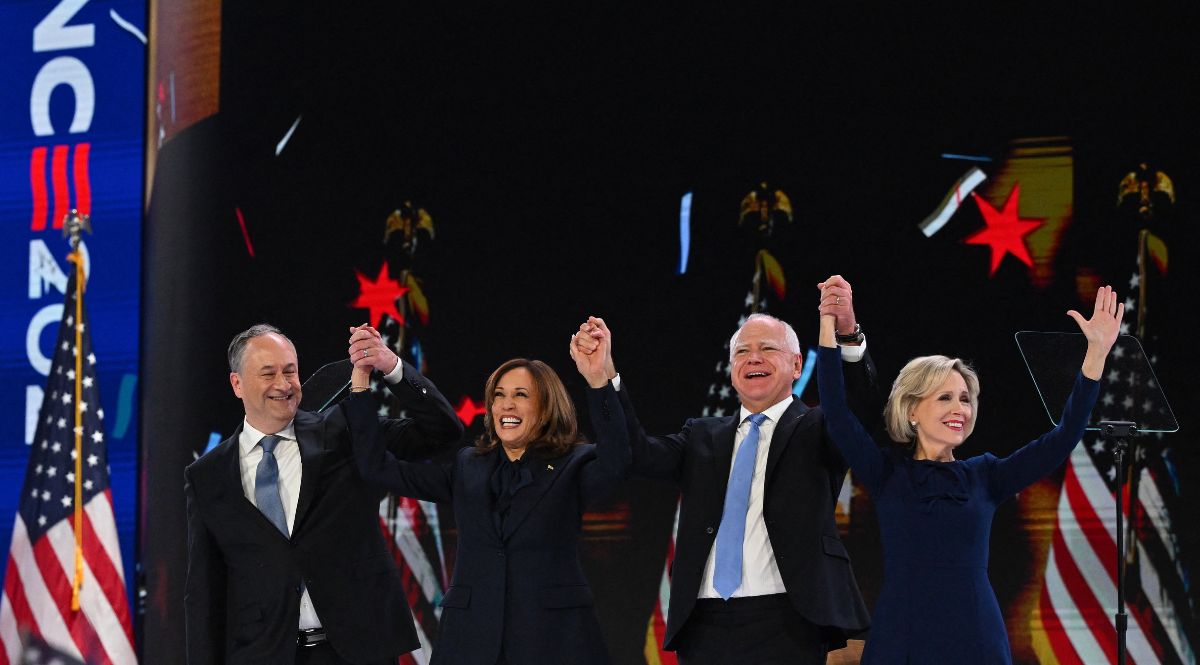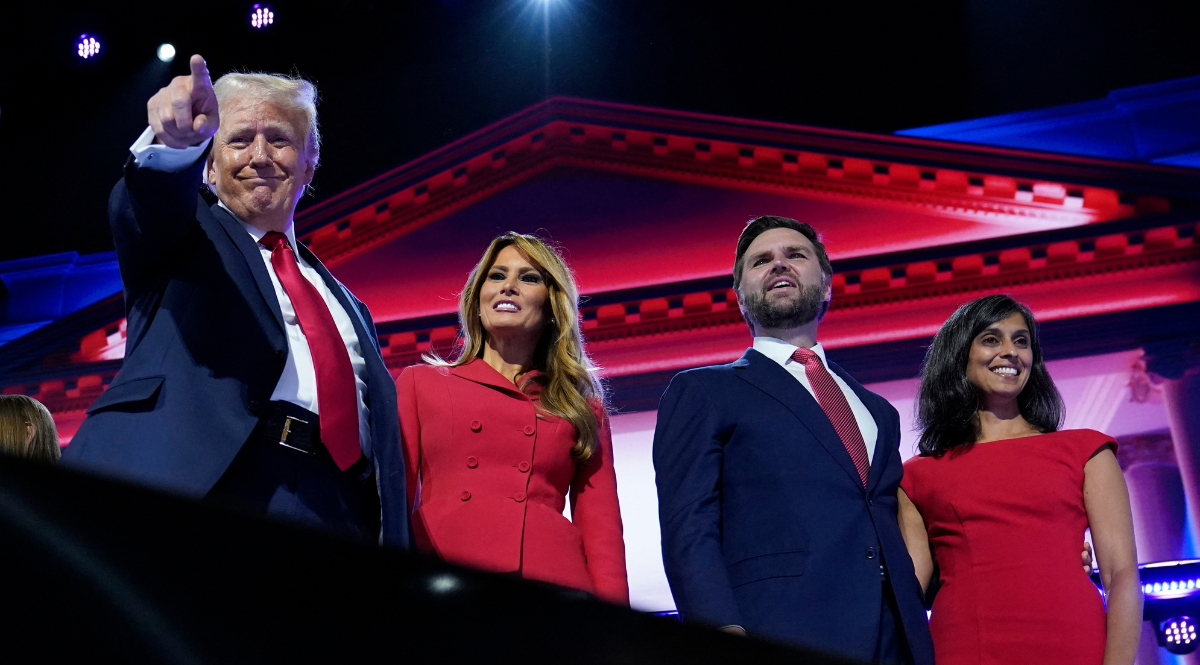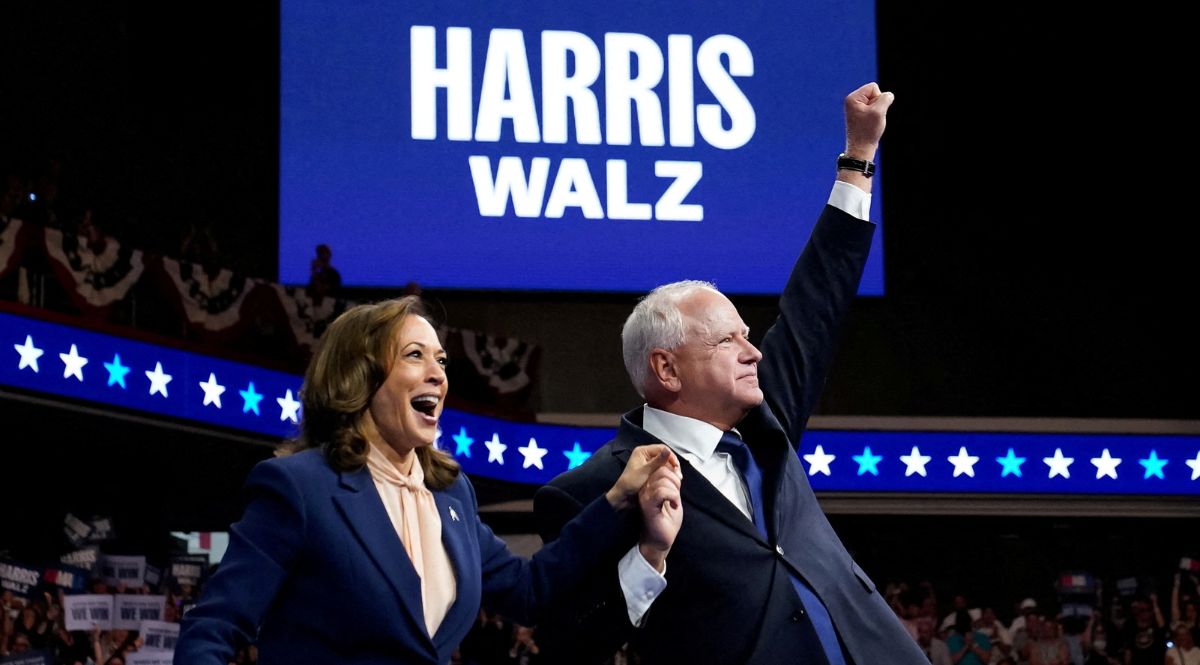Democratic National Convention a Show of Unity after Switch to Harris
During the Democratic National Convention on 19-22 August 2024, Kamala Harris officially accepted her party’s nomination as candidate for U.S. president. For her running mate and vice presidential candidate, she picked Minnesota Governor Tim Walz, who was formally nominated and selected. The party unified around Harris as her rising popularity among registered voters strengthens the Democrats’ chances of beating Donald Trump in the November elections.
 Callaghan O'Hare / Reuters / Forum
Callaghan O'Hare / Reuters / Forum
What were the highlights of the Democratic National Convention?
The convention focused on the slogan, “For the people, for our future”. It took place in Chicago, Illinois, which is one of the main political centres of the Democratic Party in the Midwest, which is otherwise a region with a strong conservative tendency. Democrats hope that their political declarations from the convention will influence voters, especially undecided ones in the neighbouring “swing” states of Wisconsin and Michigan, which, along with Pennsylvania, are considered crucial to a Democratic victory.
President Joe Biden delivered a speech summarising his political career, in which he handed over the leadership of the party to Harris, his vice president, and the young generation of politicians around her. The incumbent president emphasised his achievements, including on the economy, citing them also as Harris’ successes. The enthusiasm for Harris’ candidacy was also reflected in speeches by both Bill and Hillary Clinton and Barack and Michelle Obama, as well as the presence of prominent TV figures (e.g., Oprah) and musical artists (e.g., Lil Jon and Pink). In speeches to the delegates, the politicians Alexandria Ocasio-Cortez and Bernie Sanders announced closer cooperation between left-wing Democrats and Harris–Walz in implementing an ambitious progressive programme (e.g., healthcare and social security reform). When accepting the nomination, Harris pointed to defeating Trump as the primary goal of her campaign. She attacked “Project 2025”, a vast reform plan prepared by conservative experts linked to Trump, calling it dangerous and too extreme. She addressed her message mainly to the undecided electorate, Republican voters critical of Trump, and Democrats disappointed with Biden. On foreign affairs, she signalled continued support for Ukraine, close cooperation with NATO allies, and efforts to end Israel’s war in Gaza. A series of pro-Palestinian demonstrations were held outside the convention area, criticizing the Biden administration for its approach to the war in Gaza, including military support for Israel.
What will be the Democrats’ electoral strategy?
Harris’ nomination indicates her strong position as the new leader of the Democratic Party. The campaign will focus on strengthening her image as a candidate with the necessary experience who is best prepared to hold office. This will include emphasising her career as California’s attorney general to convince undecided voters of her tough stance on law-and-order issues. A recent poll by Ipsos indicates that 53% of voters consider her to be a candidate with the appropriate qualifications to serve as president (as compared to 47% for Trump). A permanent element of the campaign will be pointing to Trump as one who divides society and intensifies social conflicts. He and his party’s position on reproductive rights will also be attacked—this policy area is one of the most important electoral issues, in which, according to polls, Harris has a 12% advantage over her competitor. The campaign will attempt to mobilise both the progressive and moderate wings of the Democratic Party. The nomination of Walz as vice presidential candidate will strengthen the importance of social policy, but may also facilitate in mobilising an electorate critical of progressive demands, including people living in rural areas in Midwestern states, white working-age middle-class men, and Latin American voters in the so-called Sun Belt—states like North Carolina, Georgia, Arizona, and Nevada. It will be important to present a detailed election programme that includes Harris’ position on immigration and crime, in which the majority of voters surveyed support Trump’s position on these issues. Changing the narrative on economic policy, which is the most important election issue, will also be key. The state of the economy during the Biden administration is negatively assessed by most Americans. Points initially made by Harris during a campaign rally in North Carolina were seen by some, especially the influential newspaper The Washington Post, as being too populist and partially consistent with Trump’s position (e.g., repealing the federal tax on tips).
What condition is the Democratic Party in after the Convention?
The formal selection of Harris as the party’s candidate in the upcoming elections allowed the Democrats to unite and restored faith in victory over Trump. Consolidation was achieved, among others, thanks to Harris’ support from former presidents Bill Clinton and Barack Obama, as well as former Secretary of State Hillary Clinton and former First Lady Michelle Obama who are considered pillars of the Democratic Party. Harris’ nomination was met with significant enthusiasm and a surge in support among voters, particularly African Americans, women, and those under 40. In the latest national polls, 50% of voters support her while 45% back Trump. In states perceived as key to winning the 2024 presidential race, Harris is consolidating the electorate and regaining support that was at a much lower level before Biden stepped down. She has already gained a slight advantage, for example, in Michigan and Nevada, an increase in support in Arizona and Georgia where Trump has a slight lead, while tying with Trump in Pennsylvania and Wisconsin. The Harris campaign will focus its efforts on these state in an effort to maintain and expand its lead. However, a stronger progressive agenda may make it more difficult for the party to expand the electorate to include moderate voters in undecided states, including North Carolina, Arizona, Georgia, and Nevada, where, according to polls, 43% view Harris as too liberal.
How will Harris’ nomination affect the Trump campaign?
Harris’ acceptance of the Democratic Party’s nomination will force the Trump campaign to change its electoral strategy. Until now, it had been solely focused on competing with the older Biden, whose ability to fulfil the duties of the presidency for a second term were increasingly questioned in recent months. Republicans will base their campaign against Harris on a negative message about her progressive agenda, which Trump refers to at his rallies as “socialist” or “communist”. A crucial element will be the attempt to blame her for the migration crisis on the border with Mexico and her alleged soft stance on law-and-order issues. Meanwhile, the Republican candidate for vice president, J.D. Vance, will attack Walz, recently questioning his military service in the National Guard and criticizing his response to the 2020 protests in Minneapolis as too soft. Contrary to the recommendations of his advisers, Trump will probably not be able to refrain from personal attacks on Harris, which may in the long run may cost him undecided voters.





